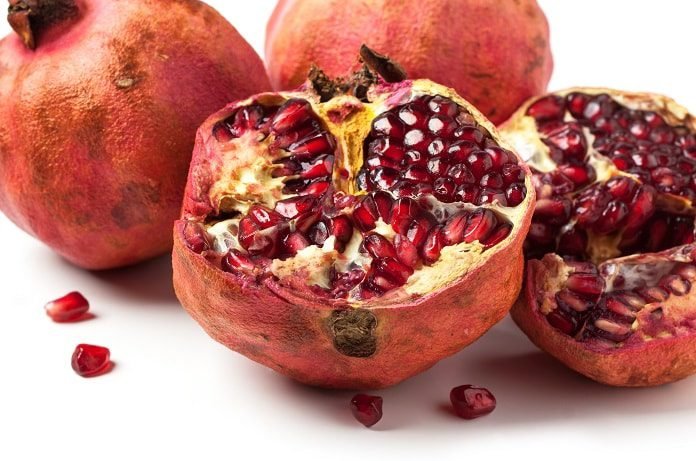Punicic acid, found abundantly in pomegranate seed oil, has been found to be beneficial for inflammatory and metabolic conditions and may be of value for cancer and neurodegenerative disease as well.
Pomegranate contains various bioactive compounds; pomegranate seed oil (PSO) is particularly beneficial to our health, as reported by several studies in human and animal models.
PSO contains an abundance (74-85 %) of a compound called punicic acid (PA), which has been studied widely for its therapeutic potential.
Chemically, PA is an isomer of conjugated linolenic acid (CLA).
Various reports indicate that PA is beneficial for conditions like obesity, diabetes, inflammation, and metabolic syndromes. During the processing of pomegranate juice, the lipolytic enzymes can be deactivated, thereby reducing therapeutic potential.
Studies are needed to determine how to maximize the beneficial components of the pomegranate during processing.
Oral administration of PA to rats and humans has confirmed that it is metabolized to CLA, indicating that consumption of PA-containing products is a source of CLA for the body. Other sources of CLA are sunflower oil, snake guard seed oil, and maxim seeds.
Antioxidant properties of PA were found to decrease the harmful effects of physiological oxidation processes, such as lipid-peroxidation, resulting in decreased weight gain, energy consumption, and triglyceride (TG) levels in mouse models.
Several studies assessing the anti-diabetic properties of PA in mouse models have produced contradictory results. Other studies have reported lipid-lowering properties and improvement in insulin sensitivity in obese mice, lowering the risk of type 2 diabetes.
Lipid-lowering properties have also been shown by xanthigen, a derivative of PA which is extracted from pomegranate.
PA (PSO) has been found to be effective against various physiological disorders like inflammation and metabolic syndrome by decreasing the reactive oxygen species and mediators of inflammation. In vivo studies have shown that enhanced expression of genes like PPAR-d, ROR-a, and suppression of TNF-a, IL-7, and TNF-y cause molecular changes that ultimately improves diabetic and inflammatory status. These changes also improve mitochondrial dysfunction, which may be related to the improvement in metabolic syndromes.
Regarding safety, PA (PSO) is non-toxic and non-mutagenic.
Additional studies are needed to gain a better understanding of the potential of the numerous bioactive compounds found in the pomegranate fruit.
Written By: Mandira Manandhar, PhD



